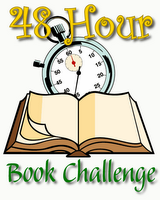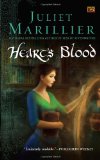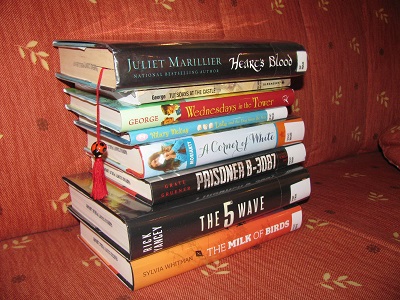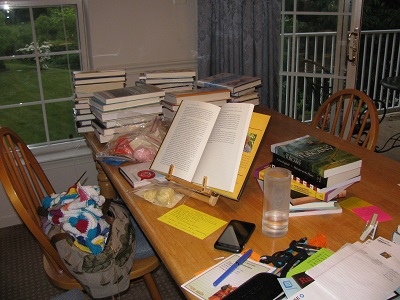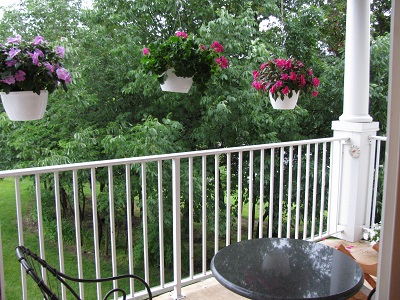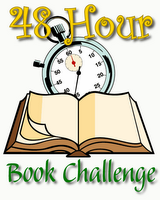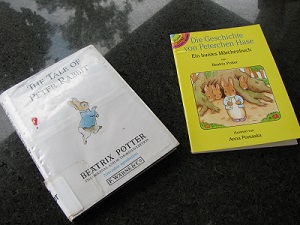 I’m doing the 48-Hour Book Challenge this weekend. If I can keep from napping for another 4 hours, I will have more than 24 hours spent reading and blogging over the last 48! Before anything else, I’m going to write my weekly feature, Sonderling Sunday, where I play with language by looking at the German translation of children’s books.
I’m doing the 48-Hour Book Challenge this weekend. If I can keep from napping for another 4 hours, I will have more than 24 hours spent reading and blogging over the last 48! Before anything else, I’m going to write my weekly feature, Sonderling Sunday, where I play with language by looking at the German translation of children’s books.
I do not believe you need to know German to enjoy Sonderling Sunday. The idea is to discover a slightly different way of looking at everyday things, to let melodious and appropriate sounds roll off your tongue, and to learn handy phrases.
By the way, I just finished listening to David Sedaris’ audiobook, Let’s Explore Diabetes with Owls, and he talks about the pitfalls of phrasebooks. Delightfully, Pimsleur sent a “Bonus track” of what would be on their Japanese instruction CDs if David Sedaris were the one writing the phrases. Think of what follows as what you’d find on a German instruction CD if I were the one writing it — using handy phrases found in children’s books.
While I was moving, I discovered that I have a small Dover edition of The Tale of Peter Rabbit, translated into German: Die Geschichte von Peterchen Hase: Ein buntes Märchenbuch von Beatrix Potter, illustriert von Anna Pomaska. That’s “The Story of Petey Rabbit: A colorful storybook.” A note in the front says, “This Dover edition… contains a German translation by Meike Werner…. For this edition the artist, Anna Pomaska, has created new illustrations based on selected images by Beatrix Potter.” I’m guessing there was copyright trouble with the original images. What do you think?
Anyway, the reason I had to feature this book is on the very first page. You probably know how the English tale starts:
“Once upon a time there were four little Rabbits,
and their names were —
Flopsy,
Mopsy,
Cotton-tail,
and Peter.”
This translates to:
Es waren einmal vier kleine Häschen, die hie?en —
Flopsy,
Mopsy,
Kuschelschwänzchen
und Peterchen.
I’m sorry, but every time I read Kuschelschwänzchen I can’t help but laugh. Yes, it means “Cotton-tail,” but it just doesn’t have the same lilt to it, does it?
Though when you see a -chen on the end of the word, that’s a diminutive. Like Cotton-tailet or Cottony-tail Apparently one can’t translate a story about little rabbits without inserting a lot of these. (At least they didn’t call the first two Flopchen and Mopchen.)
Here are some more phrases:
“underneath the root of a very big fir-tree” = unter der Wurzel einer riesigen Tanne
And I simply must quote Mrs. Rabbit’s entire warning speech:
“you may go into the fields or down the lane, but don’t go into Mr. McGregor’s garden: your Father had an accident there; he was put in a pie by Mrs. McGregor.”
ihr dürft auf die Felder oder den Pfad hinuntergehen, aber auf keinen Fall in Herrn McGregors Garten: euer Vater hatte dort einst einen schlimmen Unfall. Er landete schlie?lich in Frau McGregors Pastete.
My literal translation of that: “You may on the fields or the path go down, but under no circumstance in Mr. McGregor’s garden. Your father had there a bad accident. He landed finally in Mrs. McGregor’s pastry.”
I like schlimmen Unfall for “accident.” It sounds very schlimm indeed.
“Now run along, and don’t get into mischief”
= Nun lauft und gebt gut acht, da? ihr keinen Unfug macht.
Literally: “Now run and give a good eight, that you no Mischief make.”
(“Mischief” = Unfug)
“She bought a loaf of brown bread and five currant buns.”
= Sie kaufte einen Laib braunes Brot und fünf Rosinenbrötchen.
And I love any sentence with Kuschelschwänzchen:
“Flopsy, Mopsy, and Cotton-tail, who were good little bunnies, went down the lane to gather blackberries.”
= Flopsy, Mopsy und Kuschelschwänzchen, die artige kleine Häschen waren sprangen den Pfad hinunter, um Brombeeren zu pflücken.
“But Peter, who was very naughty, ran straight away to Mr. McGregor’s garden, and squeezed under the gate!”
= Das ungezogene Peterchen aber rannte direkt zu Herrn McGregors Garten und schlüpfte unter dem Gartentor hindurch!
Literally: “But the naughty Petey ran directly to Mr. McGregor’s garden and squeezed under the garden gate!”
(“squeezed” = schlüpfte)
“ate” = knabberte This gives more the idea of “nibbled.”
“rather sick” = ein bi?chen übel
“parsley” = Petersilie
“cucumber frame” = Gurkenbeetes
“young cabbages” = jungen Kohl
“waving a rake” = Er fuchtelte mit dem Rechen herum
I like this one. It’s hard to imagine him actually calling this out.
“Stop thief!” = Stehengeblieben, du Dieb!
“Peter was most dreadfully frightened.”
= Peterchen hatte fürchterliche Angst.
“unfortunately” = unglücklicherweise
“gooseberry net” = Stachelbeernetz
“got caught by the large buttons on his jacket”
= sich mit den gro?en Knöpfen seines Jäckchen darin verfangen hätte”
(“caught” = verfangen)
“shed big tears” = weinte dicke Tränen
“sparrows” = Spatzen
“sobs” = Schluchzen
(I’ve heard of choking with sobs, but saying “sobs” in German makes me choke.)
“implored him to exert himself” = ermunterten ihn, sich mehr Mühe zu geben
Literally: “encouraged him, more effort to give”
“pop upon the top of Peter” = über Peterchen stülpen
“toolshed” = Geräteschuppen
“can” = Gie?kanne
It’s always fun to see how onomatopoetic phrases are written:
“Kertyshoo!” = Hatschi!
“trembling with fright” = zitterte vor Angst
“had not the least idea” = hatte nicht die geringste Ahnung
“damp” = aufgeweicht
“wander about” = herumzustreifen
“lippity lippity” = hoppel di hopp
“no room” = keine Ritze
“squeeze underneath” = durchdrücken (“through press”)
“running” = sauste (Google: “dashed”)
“stone doorstep” = steinerne Schwelle
“carrying” = schleppte
“puzzled” = durcheinanderbrachte (“through-each-other-brought”)
“pond” = Teich
“the tip of her tail twitched” = zu zuckte die Spitze von ihrem Schwanz
“hoe” = Hacke
“scr-r-ritch, scratch, scratch, scratch” = kr-r-ritz, kratz, kratz, kritz
I enjoy this almost-rhyme:
“Peter scuttered underneath the bushes.”
= Peterchen huschte in die Büsche
“he came out” = kroch er gleich wieder hervor
“climbed upon a wheelbarrow” = kletterte auf einen Schubkarren
(“climbed on a thrust-car”)
“peeped over” = spähte
“black-currant bushes” = schwarzen Johannisbeerbüschen
“was safe at last”
= fand schlie?lich Schutz
“scare-crow” = Vogelscheuche
“to frighten the blackbirds” = um die Amseln zu erschrecken
“flopped down” = niedersank
“rabbit-hole” = Hasenhöhle
“One table-spoonful to be taken at bed-time.”
= Einen E?löffel vor dem Schlafengehen einnehmen.
“But Flopsy, Mopsy, and Cotton-tail had bread and milk and blackberries for supper.”
= Flopsy, Mopsy und Kuschelschwänzchen aber bekamen Brot und Milch und Brombeeren zum Abendessen.
Ah. That one just makes me happy. And now, if you’re ever traveling in Germany, you know what sound to make when you sneeze. Hatschi!
Gesundheit!
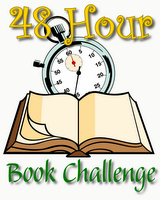 Woo-hoo! The 48-Hour Book Challenge is here again!
Woo-hoo! The 48-Hour Book Challenge is here again!